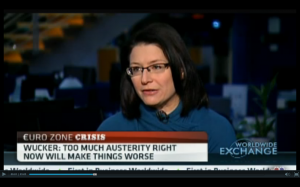I was delighted to join a panel on Social Media & Social Good February 17th, 2012, as part of Social Media Week, hosted and moderated by Kim Slicklein (President of Ogilvy Earth). Fellow panelists were Analisa Balares, CEO of Womensphere; James Windon, Vice President, Business Development at Causes; and Scott Dodd, Editor OnEarth.org NRDC. The panel also included great insights from some groundbreaking research on human behavior by Ogilvy Earth. Continue reading “Peer Pressure for Good – Social Media Week Panel”
Author: Michele
Global HR Forum (Seoul)
Video from my comments at the Global HR Forum in Seoul, South Korea, November 2, 2011, on a panel “Are We Headed Towards Another Global Economic Crisis?” with Professor Francis Fukuyama of Stanford University, Professor Weiping Huang of Renmin University of China, and Moderator Seunghoon Lee, Professor Emeritus, Division of Economics, Seoul National University
(My comments begin at 53:20) The short answer is no -we’re not in another global economic crisis because we never left the one we already have been in.
CNBC Worldwide Exchange on Greece
Europe’s Debt Crisis: CNBC Video and Commentary
I’ve been arguing that Europe needs an orderly debt restructuring for Greece to avoid much worse consequences. There’s video below of my guest host appearance on CNBC’s Worldwide Exchange with Nicole Lapin May 23, 2011, discussing the challenges facing Europe as it struggles with Greece’s debt crisis.
A CNBC follow-up article, “Will Eurobonding Save the Day?” further discussed a proposal which I support -originally made by the Brussels-based think tank Bruegel- to pool European debt into a more liquid Euro-bond. Actually, it would involve two kinds of Euro-bonds: senior “Blue bonds” representing debt under 60% of each nation’s GDP, and junior “Red bonds,” for higher amounts, which would trade at much higher yields reflecting the increased risk. The Bretton Woods Project also has cited my argument for an orderly pre-emptive default in a June 13 article, “IMF’s European Austerity Drive Goes On Despite Failures and Protests“
Chronicle of a Debt Foretold
Today’s debt crises among European sovereigns and US underwater mortgage holders both have much in common with a similar chronicle of debt foretold in Argentina a decade ago: the answer that involves the least amount of pain is a swift restructuring. In “Chronicle of a Debt Foretold,” a new paper for the World Economic Roundtable, organized jointly by the World Policy Institute and the Economic Growth Program of the New America Foundation, I argue that the answer is similar to the stitch in time that was proposed for Argentina, on which policy makers failed to act, modeled on the Brady Plan debt restructurings that resolved the 1980s sovereign debt crisis. We need a new Brady Plan for both the troubled European sovereign debtors, and for US underwater mortgages, before we lose another decade, as we did in the 1980s.
2011 Outlook on opendemocracy.net
The editors at opendemocracy.net, one of my favorite websites, asked me and a group of writers from around the world, “Where are the sources of inspiration that can improve global and national prospects in 2011?”
Here are my thoughts:
Citizens of every country need to see their self-interest more broadly instead of pitting themselves against other groups, nationalities, religions, and classes. If people were to embrace this one idea in 2011, we’d see a world of greater cooperation and prosperity instead of the polarisation and malaise that affects so much of the world today. When your neighbour is better off, it’s more likely that you will be too.
We do not live in a zero-sum world. Yet if the xenophobes and hate-mongers have their way, we’ll be in a less than zero-sum world: everyone will be worse off, not only the purported targets. Concentrating wealth in the hands of the mega-rich while leaving less than crumbs for the working class destabilises society and shrinks purchasing power that could create more wealth for everyone. A country or community that cracks down unfairly on immigrants and minorities is biting off its nose to spite its face; it pulls the rug out from under families, economies, and communities instead of supporting new communities and economies. Demonising another religion instead of seeking dialogue puts precious energy into destruction instead of building. An extremist political party that puts up roadblocks, no matter what the issue, ends up destroying people’s trust in the political process instead of creating positive change.
The unintended consequences of division undermine the very goals that politicians and leaders invoke to justify actions intended to punish the few instead of to reward the whole. It’s time to change that dynamic.
BNN Canada interview at Toronto Forum
BNN (Canada) SqueezePlay Future of Cities – Immigration Matters [11-22-10 5:40 PM]
In Canada for the Toronto Forum for Global Cities, Michele Wucker, President of the World Policy Institute, discusses the importance of having an effective immigration strategy to compete effectively for the highly skilled workers that keep the economy driving forward. To view the BNN video follow this link.
CNBC: Structural Imbalances in the US Economy
Monday, August 30, 2010 “Worldwide Exchange”
Clip from Guest Host Appearance
”We’ve got a structural problem where Americans aren’t being matched up properly with the jobs that are available,” Michele Wucker from the World Policy Institute told CNBC, adding that the stimulus plan needs “to be used wisely.”
